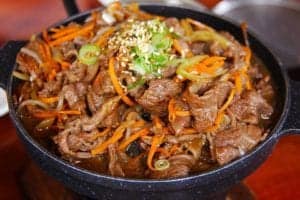African Americans have a higher rate of colon cancer than other groups, and now new research shows why that might be the case. A study has found that Black people produce higher numbers of a sulfide-producing bacteria that has been linked to the cancer.

In 2013, African Americans accounted for 33.5 colon cancer cases per 100,000 patients, a significant increase over white people who averaged just 26.8 per 100,000 incidents. To find out what could be causing the vast differences between the groups, researchers at the University of Illinois collected colonic tissue biopsies from 197 African Americans and 132 non-Hispanic whites over a two-year period. They found that the African Americans produced more sulfide-producing bacteria in their colon than non-Hispanic whites.
While sulfide bacteria is normally found in the gut, the problem arises when too much accumulates in the colon. That causes inflammation, which in turn can damage DNA.
“We found that African Americans have an increased abundance of bacteria that make hydrogen sulfide, which we demonstrated more than a decade ago to be a potent genotoxin,” said Rex Gaskins, Animal Sciences professor at the University of Illinois. “You have to have a genotoxin to have colon cancer. And sulfide is a genotoxin.”
Genotoxins are chemical agents that damage genetic information inside of a cell which causes cell mutations. These mutations can lead to cancer.
Related: Colon Cancer Rates Are Increasing Among Millennials
The study also found that the bacterium Bilophila wadsworthia, which produces hydrogen sulfide from the amino acid taurine, was more prevalent in African Americans who had colon cancer than in healthier individuals. Interestingly, the presence of the bacterium did not affect non-Hispanic whites to the point where it posed a risk.
Gaskins, who is also affiliated with the Carl R. Woese Institute for Genomic Biology, says that between 85 to 90 percent of colorectal cancer cases are sporadic, not familial. So as for why the disparity exists, genetics could be a factor, but environmental factors like being exposed to pollutants and dietary habits are also necessary to trigger the onslaught of cancer.
“These bacteria are using nutrients associated with an animal-based diet,” Gaskins added.
Diet & Environmental Contributing Factors
The study is not concluding that the presence of this bacteria is something specific to all people of the Diaspora. Native Africans have a much lower occurrence of colon cancer rates than African Americans. So the assumption is that environmental factors in addition to dietary habits and genetics may play a bigger role in the increased amounts of sulfide bacteria being produced in the guts of Black Americans.

To back up that theory, Gaskins also served as a senior co-author in a separate study in 2014, that examined the aftereffects of a meat and animal fat-based diet on rural South African Zulu people. The Zulu people normally eat a low-fat, high fiber diet. But, after the diet switch to a meat-based one, researchers found the sulfide producing bacteria increased significantly in the gut of Zulu people in less than two weeks.
Gaskins believes this data confirms previous research and studies that found diets high in red meat and animal fat to increase the risk of colon cancer.
“We are now beginning to connect the dots between these dietary factors and one’s risk of developing colon cancer risk,” said Gaskins. “Our research adds to the evidence that the microbes that inhabit the colon are part of the equation and should not be overlooked.”
Related: Men Who Eat More Red Meat Are at Risk for This Digestive Disorder
Ronke Idowu Reeves is a writer and journalist who hails from Brooklyn, NY. Her news and entertainment stories have appeared on WABC-TV-New York, Fox News Channel, VH1, BET.com plus in Sundance Film Festival’s Sundance Daily Insider and People Magazine.


![How To: ‘Fix’ Crepey Skin [Watch]](https://cdn.vitalupdates.com/wp-content/uploads/2017/05/bhmdad.png)












